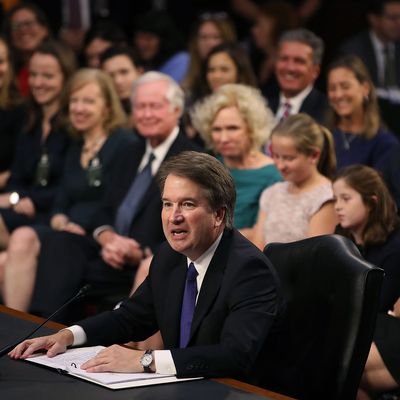
As the unpopular pick of an unpopular president for a closely divided Supreme Court with no room for error in a closely divided Senate, Brett Kavanaugh kept things simple and noncontroversial in his opening statement to the Judiciary Committee today. He did not delve deeply into constitutional theory beyond boilerplate conservative pledges to interpret rather than make law, and to serve (borrowing Chief Justice Roberts’s famous metaphor) as an impartial “umpire” in all cases. He kept his obligatory thanks to his benefactor Donald Trump short and non-effusive, and then balanced it with seven (by my count) references to the independence of the judiciary and two to the constitutional separation of powers, anticipating a major line of questioning he will hear from Democrats and possibly a couple of Republicans tomorrow.
He certainly did not play to the president’s conservative “base.” The only Supreme Court Justices he mentioned by name were the man he seeks to succeed, Anthony Kennedy (largely hated by conservative ideologues) and Justice Elena Kagan in her capacity as his employer at Harvard Law School. There was nary a word about conservative icon Antonin Scalia, or the chief justice he has in the past cited as his “first judicial hero,” William Rehnquist. He did, however, manage a brief shout-out to D.C. Circuit Chief Judge Merrick Garland, the Obama SCOTUS appointee that Senate Republicans famously denied a hearing.
Perhaps even more surprisingly, Kavanaugh did not mention George W. Bush, whom he served in the White House and who first lifted him to the federal judiciary. That was an omission that had to be very deliberate, though he knows that his tenure in the Bush White House, with its missing records, will be a focus of Democrats in his later questioning.
The time Kavanaugh saved with all these omissions was largely devoted to making him seem “relatable,” and above all a friend and even a champion of women. Two of the three people chosen to introduce the SCOTUS prospect were women, one of them a celebrity with a reputation as a pro-choice centrist (Condoleezza Rice) and the other a progressive practicing lawyer (Lisa Blatt) who said Kavanaugh had counseled her about “work-family balance” issues. He touted his mother, a prosecutor and trial judge, as the person to whom the title “Judge Kavanaugh … will always belong.” He made sure to mention that a majority of the law clerks he hired as a circuit court judge were women. And he devoted a long paragraph to his experience in coaching girls’ sports teams, while working in a reference to his own daughters.
This tack rather obviously anticipates the highly legitimate fear that Brett Kavanaugh represents the fifth Supreme Court vote to reverse or eviscerate the constitutional right to an abortion.
All in all, Kavanaugh’s statement was to SCOTUS confirmation pitches what his old boss George W. Bush’s speeches were to presidential rhetoric: deliberately dumbed-down and likely to provoke critics by its omissions and oversimplifications as much as its assertions. Like Bush, Kavanaugh made a perfunctory effort at uplift:
I am an optimist. I live on the sunrise side of the mountain, not the sunset side of the mountain. I see the day that is coming, not the day that is gone. I am optimistic about the future of America and the future of our independent Judiciary. I revere the Constitution. If confirmed to the Supreme Court, I will keep an open mind in every case. I will do equal right to the poor and to the rich. I will always strive to preserve the Constitution of the United States and the American Rule of Law.
Kavanaugh made a vaguely reassuring impression that will melt away quickly in the heat he will soon face. But it blandly ended a day in the Judiciary Committee that began with fireworks.






























